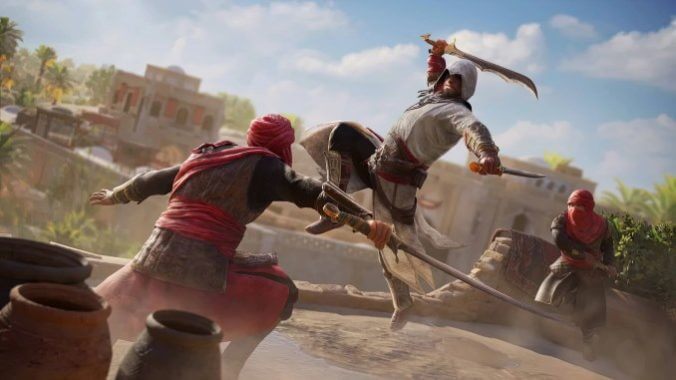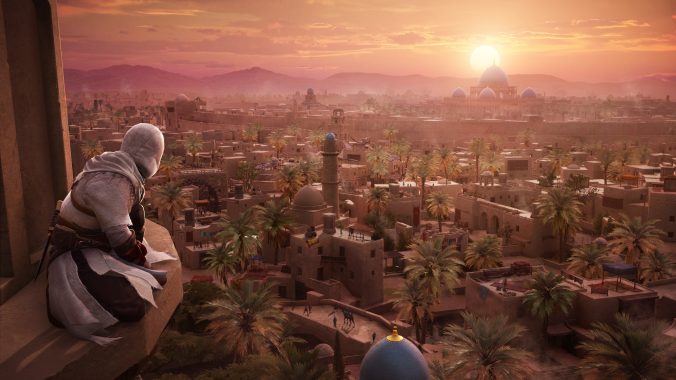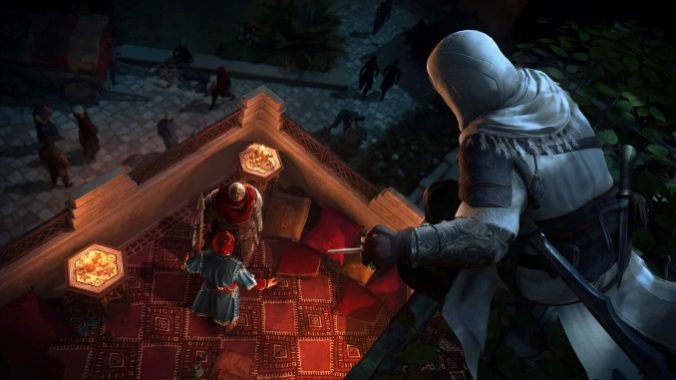Just Like an Aging Rock Band, Assassin’s Creed Mirage Gets Back to Basics

2023 marks the 15th anniversary of Assassin’s Creed, and in that time Ubisoft’s historical science fiction franchise has become perhaps the most impenetrable series in the history of games. Not counting spinoffs, there have been 13 Assassin’s Creeds since 2007. Counting spinoffs, there have been 29 games in that decade and a half, and since several of those spinoffs have stories that directly tie in to the main series, they shouldn’t all be ignored by the completionists out there. (I don’t know, check Wikipedia to see which of them you should play; I certainly haven’t touched ‘em all.) Beyond sheer numbers, the central storyline running throughout the whole damn thing hasn’t gone off the rails so much as it never even made it onto them in the first place; the very first game started with a twist beginning that introduced a modern-day setting that was never hinted at during its promotional cycle, and since then Assassin’s Creed has built out an increasingly convoluted story about ancient aliens, millennia-spanning conspiracies, and an eternal war between assassins and Templars (including earlier secret societies that predate both historical groups), mostly within the meta framework of people from today interacting with a simulation of the past. It’s even turned the very real, very weird Voynich manuscript into a regular MacGuffin. Videogames!
Assassin’s Creed Mirage wants to roll all that back just a little bit. Initially conceived as DLC for 2020’s Assassin’s Creed Valhalla, Ubisoft decided to turn it into the next mainline installment, but one that was purposefully scaled back from the excess the series has become known for. If you haven’t played an Assassin’s Creed in, oh, 15 years or so, know that it hasn’t just become the most confusing of games, but also one of the chief poster children for maximalism as a design aesthetic. The last three games—Origins, Odyssey, and Valhalla—have been especially defined by a “more is more” approach, with a heavy amount of role-playing mechanics crashing down on top of the standard Ubisoft open world formula. Their stories took dozens of hours to complete, and if you wanted to find and do everything they had to offer, you were looking at 100 hours or more.
Between that length and the pure volume of games sporting the Assassin’s Creed name, this unlikely hit has become utterly hostile to new players. Trying to pick up an Assassin’s Creed game for the very first time in 2023 is as daunting and confusing as getting into Guided by Voices or The Fall: there’s no clear entry point, so why even bother?
Well, I would say you should bother because, despite all of that (and also because of it—Assassin’s Creed is manifold), this is one of the best series of games I’ve ever played. No, I haven’t finished even half of them. Yes, I started wincing every time one does a predictable, stereotypical Ubisoft thing as far back as Assassin’s Creed: Brotherhood. These games aren’t perfect—they’re not even great, except for a few—but their utter confidence and unwavering commitment to being exactly what they’ve always been is admirable. Inspiring, even. Assassin’s Creed knows what it is, and goddamn it’s going to be that every single time. Even when it tries to be less “that,” as with Mirage.
Assassin’s Creed Mirage wants to take it back to both 2007 and the 9th century. Set in Baghdad during a time of unrest for the Abassid Caliphate (which, spoiler, ruled much of the Middle East for 500 years, from 750 to 1258), it echoes the franchise’s original setting, when Altair was pranking around the Holy Land during the Third Crusade. There’s almost no sign of the Animus, the VR device that’s been the central point of the modern day storyline since day one. Mirage pretty much puts us fully in the past, playing as a member of a pre-assassin group known as the Hidden Ones, and trying to track down a shady cabal of five fascists known as The Order (not that Order) who want to rule from behind the scenes and who all wear different variations on what looks like Agamemnon’s death mask. (They’d totally hang out with Klytus from Flash Gordon.) Our guy is a poor thief turned neophyte Hidden One named Basim Ibn Ishaq, who you may or may not know as one of the villains from Valhalla. Turns out he was a pretty solid dude in his younger days, before he learned he was somehow the reincarnation of the ancient alien who inspired the Loki myth.

That’s not the Basim we meet in Mirage. He’s a petty thief in Anbar picking off coin purses from all the swells in town, until a fateful night involving a visit from the Caliph and the wrong end of a knife. Basim splits town and winds up with the Hidden Ones in their secret mountain hideout, where he learns all the tricks of (proto-)assassination. After what amounts to a two hour (or so) tutorial (short for these games), Basim heads to Baghdad, which is where the bulk of the action goes down.
Baghdad is split into four main sections, each with its own secret Hidden Bureau, where Basim chats up his elders for storyline missions and chooses optional side-quests from whatever 9th century Baghdad considered a bulletin board. On the ground (and rooftops) Mirage feels like almost every Assassin’s Creed you’ve ever played; Basim dashes throughout the city, seamlessly climbing up buildings, using ropes to zip up to the rooftops, and hurling his body in every direction with little care for his own health. (For the first time there are poles throughout the city that he can use to basically vault himself from spot to spot; I think I did it twice in about 20 hours of play.) When Baghdad’s finest are on his tail, Basim has to not just hightail it away from them but also try to break their sightline before hiding and waiting for them to stop searching for him. If he breaks any laws in plain sight of others, his “notoriety” level will go up, and he’ll have to rip wanted posts off walls (or bribe a town crier) to get the heat off his back. This is all basic, foundational Assassin’s Creed business, and if you’ve been playing these things as long as I have it’ll all be second nature.
-

-

-

-

-

-

-

-

-

-

-

-

-

-

-

-

-

-

-

-

-

-

-

-

-

-

-

-

-

-

-

-

-

-

-

-

-

-

-

-









































